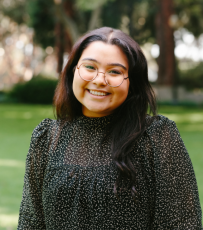America is in a state of emergency— women are undergoing a direct war on reproductive health going back on a nearly 50-year precedent, attacking human rights across America. Millions of people across the nation are absorbing the news of the Supreme Court’s decision to overturn Roe v Wade and thousands across the world are witnessing the spectacle of the Supreme Court.
Millions of women across the nation are absorbing the news of the Supreme Court’s decision simply because for many, Roe v Wade was about more than abortion, it was about freedom and recognizing that the abolition of human rights will not stop there, especially with a government that fails to put the people first.
The criminalization of abortion and access to care affects more than just the people who seek those particular forms of care— it criminalizes and reduces access to health equity and safety for communities, especially for women of color. As a Latina woman, the daughter of immigrants, and growing up in a very progressive state like California I recognize the privilege of living in a state upholding reproductive rights and care. But as a woman and a person of color, I fear and stand in solidarity with the thousands of women, women of color, and low-income populations who are disproportionately affected by higher rates of abortions inflicted systemically, driven by a lack of access to and effective use of contraceptives. Women live in states actively working against their fundamental human right to bodily autonomy.
Too quickly as a society, we forget that we can be actors of change. As people take the streets of America to mobilize themselves for their rights, we can see that more than ever solidarity and mutual aid is essential amongst all people. This issue affects us all, the power must be restored to the people.
In these times, more than ever, I find hope and admiration for the determination and power in kindness— on June 17, 2022, the efforts by the Girl Up Club at Wakefield High School who took the initiative to sell home-made soap on the streets of Arlington, Virginia and raised over $682 for an education fund for girls in Zimbabwe can teach us the power of solidarity. The socio-economic conditions in Zimbabwe have limited the ability to obtain education for many young women in their communities. They are quick to work or get married in an attempt to help their families in poverty— these limitations have created a network of solidarity that we see in the Women’s Advocacy Project. During times like these, the girls in Arlington and Zimbabwe pave the way for a blueprint of what solidarity looks like across women transnationally and push me to join together to support the fight for human rights.
In a nation where the right to carry a gun is more protected by the highest court of the law, following a decade of mass shootings, where the government is ending the EPA’s ability to regulate greenhouse gas pollution during a mass climate crisis, it is important to turn to each other and recognize the power of the people. When people come together to take on the crisis, you are organizing and becoming agents of change rather than merely surviving. What mutual aid networks achieve is it breaks the stigma and isolation of the problem and instead supports the vulnerable population and instead mobilizes them.
Posted By Aimee Benitez
Posted Jul 7th, 2022


3 Comments
Evan Cranmer
July 13, 2022
Hi Aimee,
I really enjoyed your blog. I think this is a tumultuous time domestically, as everyone is grappling with these landmark decisions. It is great to hear the solidarity between The Girl Up Club and Women’s Advocacy Project which speaks to your broader point–mutual aid should extend to all marginalized groups for mobilization and protection efforts.
Evan Cranmer
July 13, 2022
Hi Aimee,
I really enjoyed your blog. I think many of us are grappling with the landmark cases, trying to make sense of it all. It is great to hear the solidarity between The Girl Up Club and Women’s Advocacy project, that speaks to your broader point that mutual aid and kindness should be extended across borders, especially in tumultuous times like these.
Iain Guest
July 17, 2022
Hi Aimee. There are so many important ideas in this blog it’s hard to know where to start! You’ve certainly captured the anger and fear caused by the Supreme Court decision to criminalize abortion. It’s particularly serious for minorities, who as you point out, often find it more difficult to benefit from medical support and contraceptives. Finally, thank you for the shout-out for the students from Arlington! You’re so right when you say that community action and compassion like this are the best antidotes to a Court which has no interest in protection. We’re so glad to have you on the AP team this summer!